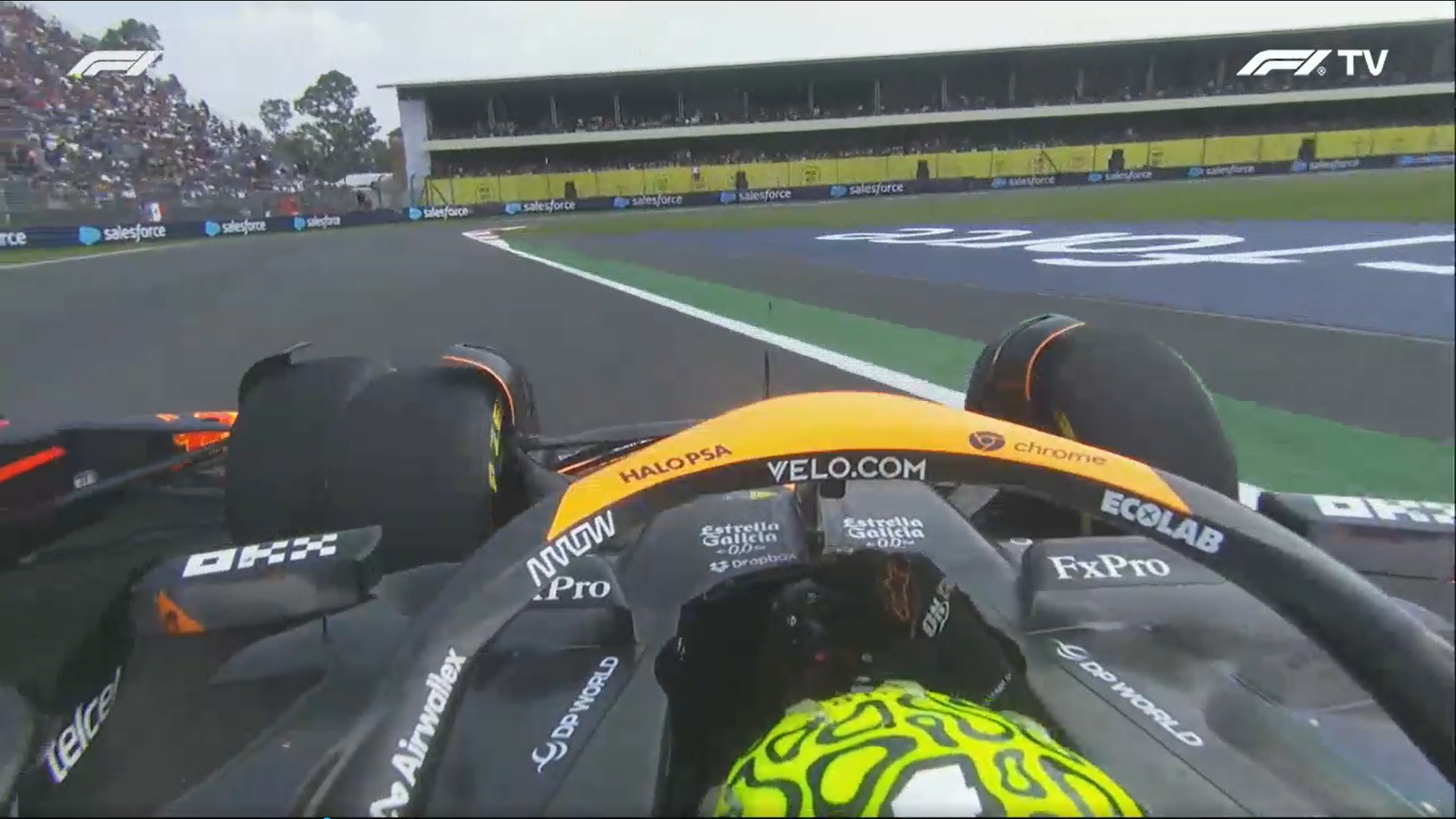Two 10-second penalties were given to Max after the two incidents in T4 and T8 of the 10th lap of the Mexico GP last Sunday. Additionally, 2 penalty points are added to Max' license which brings the total to 6 during 12 months. If I were to ask you, which of the two incidents would merit the 2 penalty points more, would you have guessed, it's the T4 incident?
In their official document of the T4 incident, the stewards are of the impression, that Lando was in front of Max 'at the entry, apex and towards the exit of the turn when he started being forced off the track' and that Lando would have been able to stay on track to finish the maneuver. (Sidenote: Horner's argument, that one would take the same lines and braking points during a fastest lap and when going wheel to wheel is laughable on its face.) The standard penalty for forcing another driver of the track has been applied. I can't see any problems with the reasoning in this case.
Now for the T8 incident:
'Following the incident in Turn 4, Verstappen attempted to pass Norris on the inside at Turn 8. Verstappen was ahead at the apex of Turn 8 and would have been entitled to racing room.' It is only because he didn't stay on track while doing all this shenanigans and then stayed in front, that he got a 10 second penalty without penalty points, which is the standard penalty for 'Leaving the track and gaining a lasting advantage'. It is not for forcing off another driver, or for provoking a crash (which Lando barely avoided).
And there lies the problem with the current driving standards guidelines. The only one available somewhere is a version from the Imola GP of 2022 (so they might be slightly out-of-date). On the second point of overtaking on the outside, they read:
'In order for a car being overtaken to be required to give sufficient room to an overtaking car, the overtaking car needs to have a significant portion of the car alongside the car being overtaken and the overtaking manoeuvre must be done in a safe and controlled manner, while enabling the car to clearly remain within the limits of the track.
When considering what is a ‘significant portion’, for an overtaking on the outside of a corner, among the various factors that will be looked at by the stewards when exercising their discretion, the stewards will consider if the overtaking car is ahead of the other car from the apex of the corner.
The car being overtaken must be capable of making the corner while remaining within the limits of the track.'
There's 3 problems with this.
-
It just makes it a race to the apex, which is in itself ill-defined. A quick part-fix: They could clarify it ahead of each weekend, e.g. given the ideal line for a quali lap. If you overtake on the outside, you'll have to get ahead by that apex and still remain on the track. If overtaking on the inside, make sure the 'front tires are alongside the other car by no later than the apex' and you are entitled to 'sufficient room'. If not, you can be forced off track, or the door closed on you respectively. Doesn't read too bad if not for the imprecise definition, the bias towards the inside car (front tires alongside the other car vs. ahead of the other car) and that it only works in one direction (if I overtake someone on the inside and got my tires alongside the sidepod of the one overtaken, I have to do it in a safe manner, but can crowd them off the track depending on the interpretation).
-
the last part of the overtaken car having to be capable of making the corner has just been ignored until that T4 incident. For a recent example: The US GP. The 'gaining an advantage' is not well defined at all ('This may include giving back the timing advantage up to drop back a position behind the relevant driver') and should imho be explicitely extended by being able to hold a position by going off-track.
-
Causing a collision is regulated in the International Sporting Code, App. L, Article 2.d). There is nothing about a provocation of a collision which was only avoided by the actions of another driver. So there is a way too large grey area which incentivizes the wronged party to actually make small contact in order for the other driver to get a penalty. And since we aren't playing bumper cars, this should be more clearly regulated, especially since the not leaving 'sufficient room' part has also been criminally negleted over the years.
Now add to all of this the inconsistencies between different stewards, or of the same stewards during the same GP (e.g. TSU penalty vs. VER non-penalty during the US GP a week ago) and we have a completely chaotic situation, where actual racing comes short.
I would love to do an actual deep dive and clip out all relevant incidents back to 2020/21 when Lewis and Fernando brought fourth the same arguments, that seem to have become more clear for a broader audience now that Max is arguably more brazen with his interpretation of the rules and guidelines and others are starting to imitate it. Alas I lack the time. The Mexico and US GPs in 2024 should be more than enough to make the points clear. And it is a positive sign, that the driving standard guidelines will be changed come 2025 and that the drivers had a productive meeting last Friday in Mexico.


From Mirriam Webster:
terror, noun, plural: terrors
(...)
a regime that rules by terror
especially : violent or destructive acts (such as bombing) committed by groups in order to intimidate a population or government into granting their demands
an act of terror
the war on terror
-> sometimes used before another noun
a terror attack